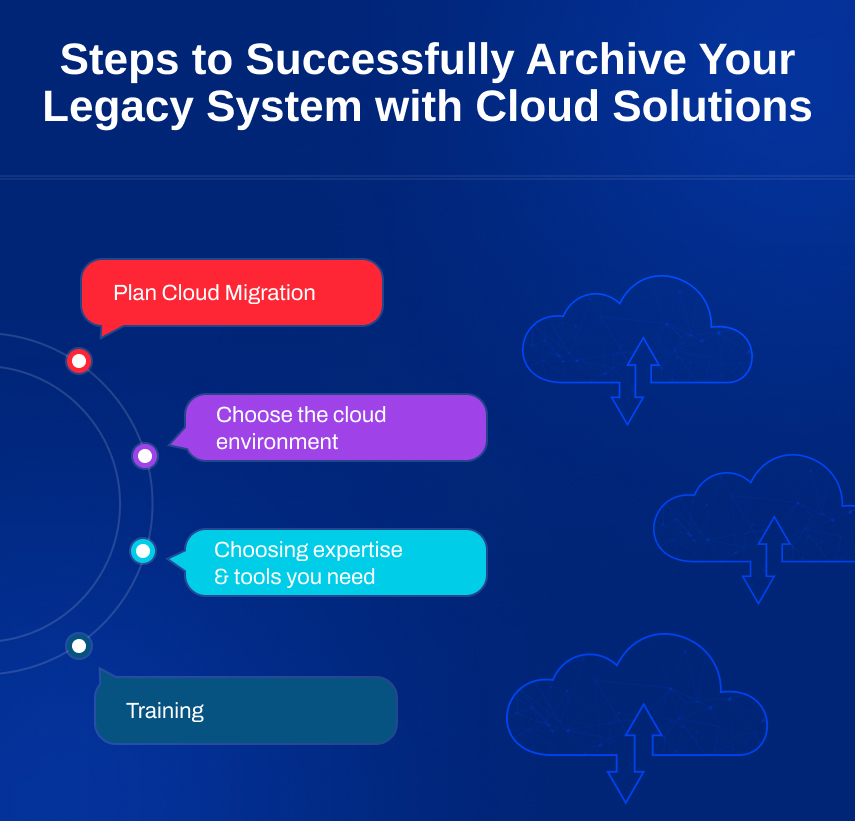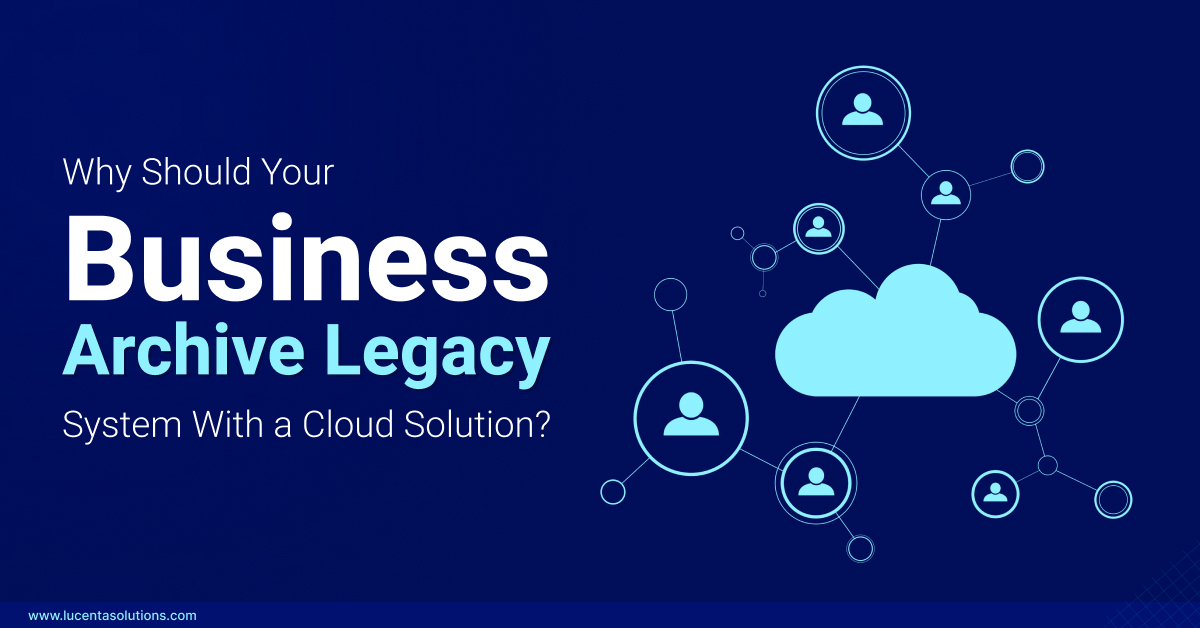Why Should Your Business Archive Legacy System With a Cloud Solution?
Does your organization maintain a legacy application? Though they might meet the needs for which they were initially designed, these systems need to be more scalable.
With advancing technology, most companies are encountering issues caused by legacy systems. In response to these challenges, businesses implemented a cloud-based alternative to the legacy system.
A staggering 94% of enterprises use cloud solutions to reap numerous benefits not possible with legacy systems.
The focus of this blog is to briefly introduce the limitations of the legacy system and what benefits cloud migration can bring to your business.
So, let’s get started.
Introduction: What Is a Legacy System and Why Archive It?
Typically, legacy systems refer to outdated applications or software installed on-premises.
Legacy systems lack scalability, which is their major disadvantage. In addition, as the business grew, these systems failed to meet the growing needs of the company, leading to their obsolescence.
A legacy application is usually associated with a particular operating system or programming language. For example, an application designed for Windows 7 might not run on Windows 10 unless it is updated.
Upgrading legacy systems is a time-consuming and expensive process, and not every business has the resources to do so. Moreover, maintaining legacy systems involves investing in IT resources which will eventually have to be retired sooner or later.
Legacy systems are posing problems for businesses, and they are looking for ways to migrate to the cloud to improve business operations.
The Benefits of Migrating Your Legacy System to the Cloud
Cloud migration involve moving data, applications, and other digital assets from an on-premises environment to a virtual server hosted in the cloud. We’ll look at why you should migrate your legacy system to the cloud:
Cost Management
This is one of the significant advantages of cloud migrations. The cost of ownership will rise due to the setup and maintenance of on-premise infrastructure. Installing the system involves buying the components, hiring experts to set it up, ensuring the hardware and software are compatible, and updating it over time.
When you migrate to the cloud, your maintenance, software, and licenses costs are reduced, since you can use the provider’s infrastructure. Additionally, you pay only for what you need, reducing IT overhead costs.
Scalability
As said above, legacy systems struggle to adapt to the growing needs of the business. Poor scalability makes enterprises need to hire dedicated experts to improve the system’s capabilities.
Cloud solutions will vastly improve the company’s capabilities by implementing cloud solutions. The advantages of cloud-based solutions include scalability above all. With cloud service providers, you can focus on expanding your business while they take care of all your growing needs. Moreover, cloud solutions can be scaled instantly, so there will be no downtime.
Security
As data is now the new gold, businesses must adopt security to protect all sensitive business information. Since cloud solutions used outdated technologies in legacy systems, they typically failed to provide the best security.
While, on the other hand, cloud migrations make your business data safer and less susceptible to cyber-attacks. Most cloud providers offer security analytics, periodic updates, and cross-enterprise visibility as a part of their services to ensure improved security. Furthermore, they handle some of the most challenging security issues, including protecting your business data and apps and implementing automatic updates. The convenience of accessing all of these pre-built security features significantly reduces the worry regarding sensitive data that a business deals with.
Speed
In response to the growth of business data, the legacy system is under more strain, which results in a lack of speed.
Whenever a company moves to the cloud, the speed issue is no longer relevant, as long as you are connected to a stable internet connection.
As legacy systems rely on outdated technologies, their speed is also affected. The cloud is quickly adopting new technology that complies with the growing needs of companies and is often faster and more responsive than previous solutions. In addition, cloud service providers spend a significant amount of money & resources developing new platforms to increase speed, compatibility, and availability.
Accessibility
Nowadays, remote work is highly embraced. With legacy systems, remote working is impossible since they are designed for on-premises use only.
As a result of the cloud, organizations can provide their employees with a platform that enables them to work from anywhere in the world. It reduces infrastructure costs for the organization and allows it to hire top talent globally to pave the way to success.
Mobility
Accessibility is limited with legacy software. For instance; an application built for Windows can be used on Windows-powered devices only. Furthermore, if you have developed distinct solutions meant to be used on different devices, synching the data between them is yet another challenge to solve.
Cloud-based solutions help businesses overwrite all these challenges associated with legacy systems. It helps enterprises make their data available to their employees across multiple devices. Furthermore, cloud storage solves the data sync problem.
Steps to Successfully Archive Your Legacy System with Cloud Solutions
In today’s era, archiving legacy systems to the cloud offers numerous benefits and facilitates business growth. Now, let’s learn how to migrate from a legacy system to a cloud solution:

Plan Cloud Migration
Migration to the cloud of legacy applications starts with assessing why you need to do so. Understanding why you should migrate to the cloud and the benefits you expect from it is essential. Having this knowledge will assist you in planning your cloud journey effectively.
The main goal of migration planning is to lower the total cost by migrating only the necessary components or by making the most efficient use of resources.
Furthermore, this step involves determining when to deploy the migration so that ongoing business operations are not affected.
Choose the Cloud Environment
Cloud environments will differ in their benefits and drawbacks. A cloud environment must be evaluated carefully to identify the most suitable for your business.
Business values and long-term objectives should drive the selection of cloud environments, instead of short-term objectives like maintaining expenses. Cloud development companies can help you select the right environment to achieve meaningful results for your business.
Choosing Expertise and Tools You Need
An effective data migration tool will help you migrate data to the cloud smoothly. The market offers a wide range of data migration tools. Therefore, you should choose a tool that can be used in your legacy system and your cloud environment.
Training
Following a successful cloud migration, your next step would be to educate your employees on the cloud’s capabilities and how to utilize them. Cloud service providers can help you do so.
Final Take
Migration of legacy applications to the cloud makes sense in the current business environment. By investing in it, you can ensure that your business will run smoothly. However, the implementation of cloud migration should be carefully planned and executed, which may require expert assistance. As an expert in legacy applications, cloud environments, and cloud migration, Lucenta Solutions makes cloud migration a breeze.




